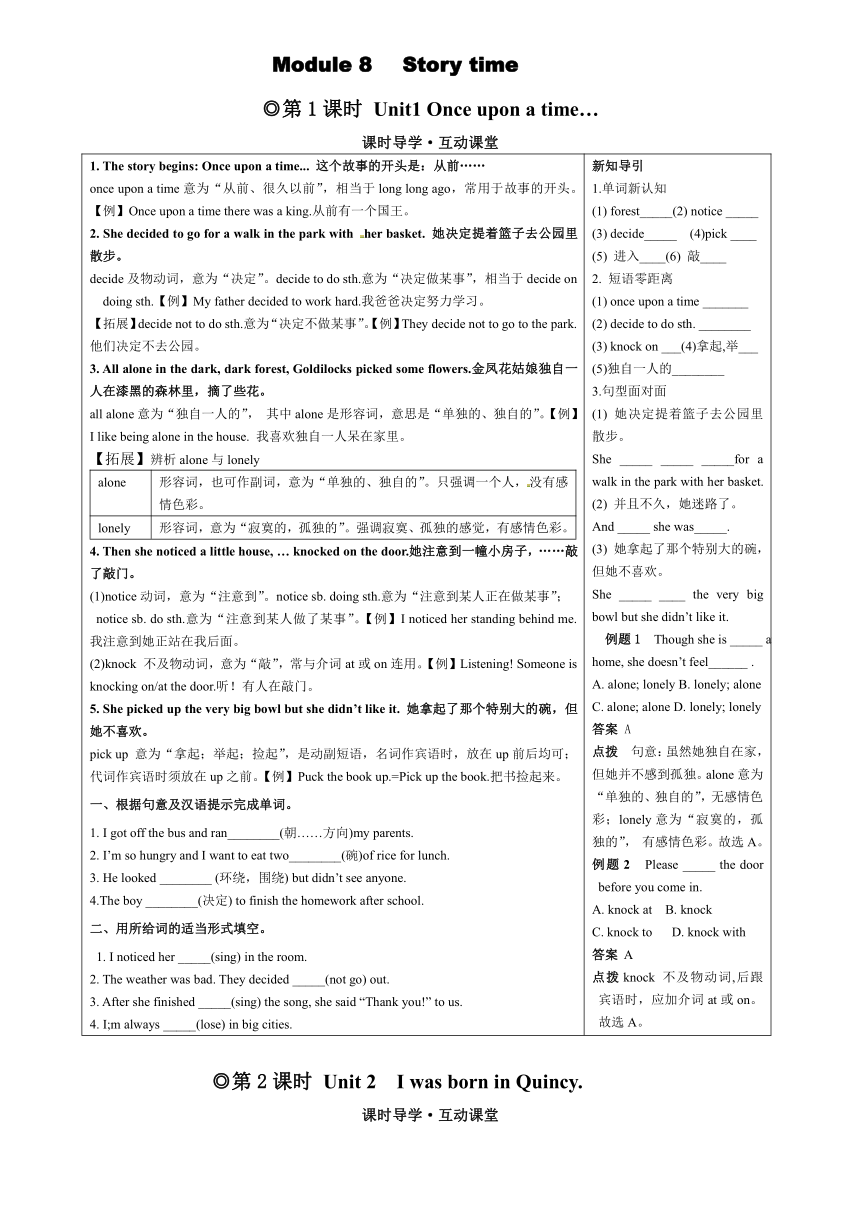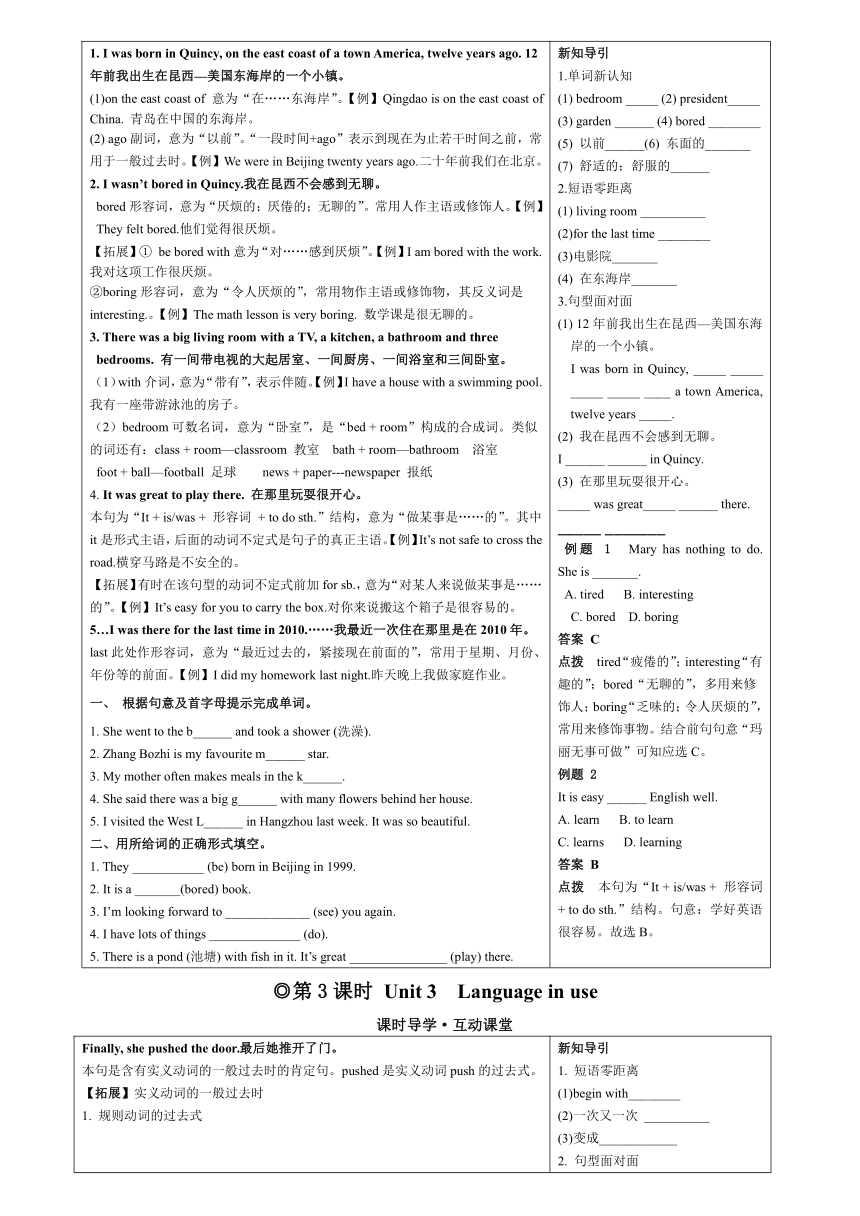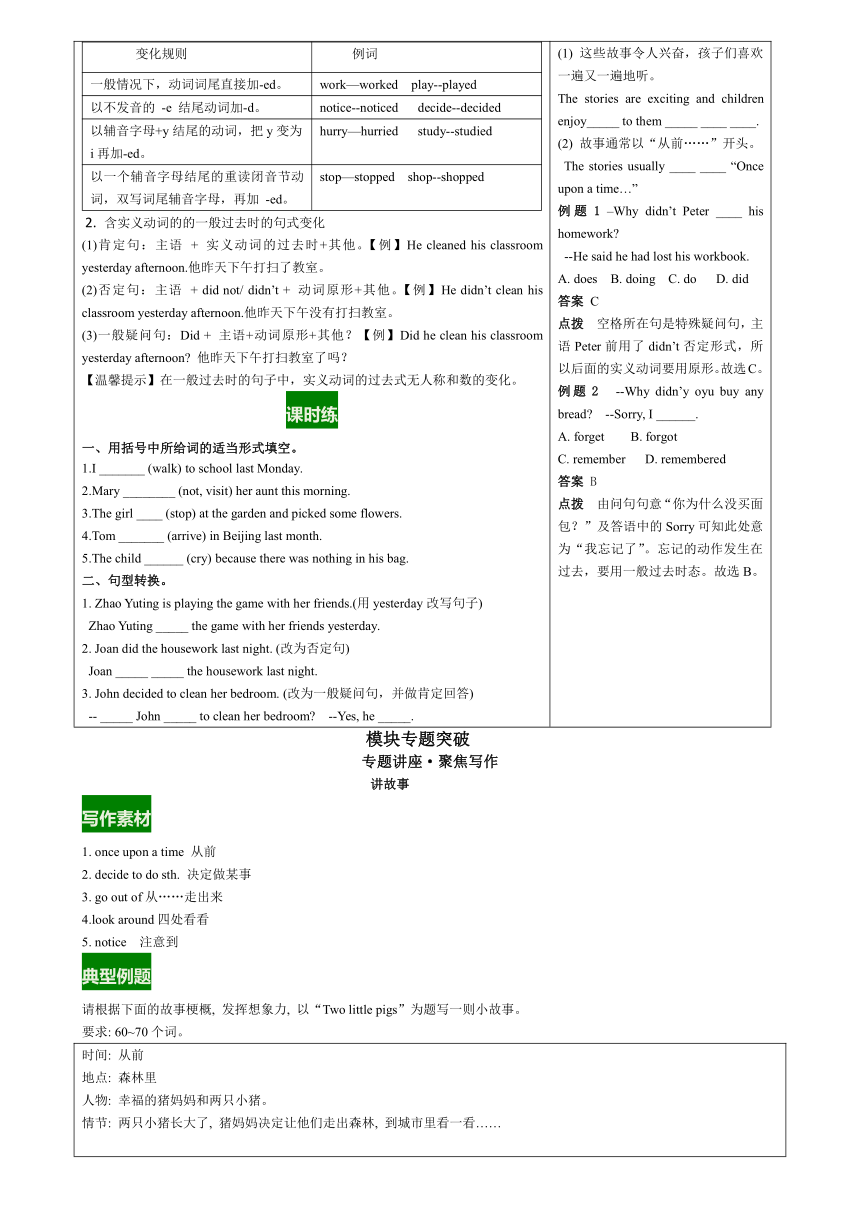Module 8 Story time 全模块同步学案(含答案)
文档属性
| 名称 | Module 8 Story time 全模块同步学案(含答案) |

|
|
| 格式 | zip | ||
| 文件大小 | 1.2MB | ||
| 资源类型 | 试卷 | ||
| 版本资源 | 外研版 | ||
| 科目 | 英语 | ||
| 更新时间 | 2019-05-14 00:00:00 | ||
图片预览



文档简介
Module 8 Story time
◎第1课时 Unit1 Once upon a time…
课时导学·互动课堂
1. The story begins: Once upon a time... 这个故事的开头是:从前……once upon a time意为“从前、很久以前”,相当于long long ago,常用于故事的开头。【例】Once upon a time there was a king.从前有一个国王。2. She decided to go for a walk in the park with her basket. 她决定提着篮子去公园里散步。decide及物动词,意为“决定”。decide to do sth.意为“决定做某事”,相当于decide on doing sth.【例】My father decided to work hard.我爸爸决定努力学习。 【拓展】decide not to do sth.意为“决定不做某事”。【例】They decide not to go to the park.他们决定不去公园。3. All alone in the dark, dark forest, Goldilocks picked some flowers.金凤花姑娘独自一人在漆黑的森林里,摘了些花。all alone意为“独自一人的”, 其中alone是形容词,意思是“单独的、独自的”。【例】I like being alone in the house. 我喜欢独自一人呆在家里。【拓展】辨析alone与lonely alone 形容词,也可作副词,意为“单独的、独自的”。只强调一个人,没有感彩。 lonely形容词,意为“寂寞的,孤独的”。强调寂寞、孤独的感觉,有感彩。 4. Then she noticed a little house, … knocked on the door.她注意到一幢小房子,……敲了敲门。(1)notice动词,意为“注意到”。notice sb. doing sth.意为“注意到某人正在做某事”; notice sb. do sth.意为“注意到某人做了某事”。【例】I noticed her standing behind me.我注意到她正站在我后面。 (2)knock 不及物动词,意为“敲”,常与介词at或on连用。【例】Listening! Someone is knocking on/at the door.听!有人在敲门。5. She picked up the very big bowl but she didn’t like it. 她拿起了那个特别大的碗,但她不喜欢。pick up 意为“拿起;举起;捡起”,是动副短语,名词作宾语时,放在up前后均可;代词作宾语时须放在up之前。【例】Puck the book up.=Pick up the book.把书捡起来。一、根据句意及汉语提示完成单词。1. I got off the bus and ran________(朝……方向)my parents. 2. I’m so hungry and I want to eat two________(碗)of rice for lunch. 3. He looked ________ (环绕,围绕) but didn’t see anyone. 4.The boy ________(决定) to finish the homework after school. 二、用所给词的适当形式填空。1. I noticed her _____(sing) in the room. 2. The weather was bad. They decided _____(not go) out. 3. After she finished _____(sing) the song, she said “Thank you!” to us.4. I;m always _____(lose) in big cities. 新知导引1.单词新认知(1) forest_____(2) notice _____ (3) decide_____ (4)pick ____ (5) 进入____(6) 敲____2. 短语零距离 (1) once upon a time _______(2) decide to do sth. ________(3) knock on ___(4)拿起,举___ (5)独自一人的________3.句型面对面 (1) 她决定提着篮子去公园里散步。She _____ _____ _____for a walk in the park with her basket. (2) 并且不久,她迷路了。And _____ she was_____.(3) 她拿起了那个特别大的碗,但她不喜欢。She _____ ____ the very big bowl but she didn’t like it. 例题1 Though she is _____ athome, she doesn’t feel______ .A. alone; lonely B. lonely; alone C. alone; alone D. lonely; lonely答案 A点拨 句意:虽然她独自在家,但她并不感到孤独。alone意为“单独的、独自的”,无感彩;lonely意为“寂寞的,孤独的”, 有感彩。故选A。例题2 Please _____ the door before you come in. A. knock at B. knock C. knock to D. knock with答案 A点拨knock 不及物动词,后跟宾语时,应加介词at或on。 故选A。
◎第2课时 Unit 2 I was born in Quincy.
课时导学·互动课堂
1. I was born in Quincy, on the east coast of a town America, twelve years ago. 12年前我出生在昆西—美国东海岸的一个小镇。(1)on the east coast of 意为“在……东海岸”。【例】Qingdao is on the east coast of China. 青岛在中国的东海岸。(2) ago副词,意为“以前”。“一段时间+ago”表示到现在为止若干时间之前,常用于一般过去时。【例】We were in Beijing twenty years ago.二十年前我们在北京。2. I wasn’t bored in Quincy.我在昆西不会感到无聊。bored形容词,意为“厌烦的;厌倦的;无聊的”。常用人作主语或修饰人。【例】They felt bored.他们觉得很厌烦。 【拓展】① be bored with意为“对……感到厌烦”。【例】I am bored with the work.我对这项工作很厌烦。②boring形容词,意为“令人厌烦的”,常用物作主语或修饰物,其反义词是interesting.。【例】The math lesson is very boring. 数学课是很无聊的。 3. There was a big living room with a TV, a kitchen, a bathroom and three bedrooms. 有一间带电视的大起居室、一间厨房、一间浴室和三间卧室。(1)with介词,意为“带有”,表示伴随。【例】I have a house with a swimming pool. 我有一座带游泳池的房子。 (2)bedroom可数名词,意为“卧室”,是“bed + room”构成的合成词。类似 的词还有:class + room—classroom 教室 bath + room—bathroom 浴室 foot + ball—football 足球 news + paper---newspaper 报纸 4. It was great to play there. 在那里玩耍很开心。本句为“It + is/was + 形容词 + to do sth.”结构,意为“做某事是……的”。其中 it是形式主语,后面的动词不定式是句子的真正主语。【例】It’s not safe to cross theroad.横穿马路是不安全的。 【拓展】有时在该句型的动词不定式前加for sb.,意为“对某人来说做某事是…… 的”。【例】It’s easy for you to carry the box.对你来说搬这个箱子是很容易的。5…I was there for the last time in 2010.……我最近一次住在那里是在2010年。last此处作形容词,意为“最近过去的,紧接现在前面的”,常用于星期、月份、年份等的前面。【例】I did my homework last night.昨天晚上我做家庭作业。一、 根据句意及首字母提示完成单词。1. She went to the b______ and took a shower (洗澡). 2. Zhang Bozhi is my favourite m______ star. 3. My mother often makes meals in the k______. 4. She said there was a big g______ with many flowers behind her house. 5. I visited the West L______ in Hangzhou last week. It was so beautiful. 二、用所给词的正确形式填空。1. They ___________ (be) born in Beijing in 1999. 2. It is a _______(bored) book.3. I’m looking forward to _____________ (see) you again. 4. I have lots of things ______________ (do). 5. There is a pond (池塘) with fish in it. It’s great _______________ (play) there. 新知导引1.单词新认知(1) bedroom _____ (2) president_____ (3) garden ______ (4) bored ________ (5) 以前______(6) 东面的_______ (7) 舒适的;舒服的______2.短语零距离(1) living room __________ (2)for the last time ________ (3)电影院_______ (4) 在东海岸_______3.句型面对面(1) 12年前我出生在昆西—美国东海岸的一个小镇。 I was born in Quincy, _____ _____ _____ _____ ____ a town America, twelve years _____. (2) 我在昆西不会感到无聊。I ______ ______ in Quincy. (3) 在那里玩耍很开心。 _____ was great_____ ______ there._____ _______ 例题 1 Mary has nothing to do. She is _______. A. tired B. interesting C. bored D. boring答案 C 点拨 tired“疲倦的”;interesting“有趣的”;bored“无聊的”,多用来修饰人;boring“乏味的;令人厌烦的”,常用来修饰事物。结合前句句意“玛丽无事可做”可知应选C。例题 2 It is easy ______ English well. A. learn B. to learn C. learns D. learning答案 B 点拨 本句为“It + is/was + 形容词 + to do sth.”结构。句意:学好英语很容易。故选B。
◎第3课时 Unit 3 Language in use
课时导学·互动课堂
Finally, she pushed the door.最后她推开了门。本句是含有实义动词的一般过去时的肯定句。pushed是实义动词push的过去式。【拓展】实义动词的一般过去时 1. 规则动词的过去式 变化规则例词 一般情况下,动词词尾直接加-ed。work—worked play--played以不发音的 -e 结尾动词加-d。notice--noticed decide--decided以辅音字母+y结尾的动词,把y变为i再加-ed。hurry—hurried study--studied以一个辅音字母结尾的重读闭音节动词,双写词尾辅音字母,再加 -ed。stop—stopped shop--shoppedm]2. 含实义动词的的一般过去时的句式变化(1)肯定句:主语 + 实义动词的过去时+其他。【例】He cleaned his classroom yesterday afternoon.他昨天下午打扫了教室。(2)否定句:主语 + did not/ didn’t + 动词原形+其他。【例】He didn’t clean his classroom yesterday afternoon.他昨天下午没有打扫教室。 (3)一般疑问句:Did + 主语+动词原形+其他?【例】Did he clean his classroom yesterday afternoon? 他昨天下午打扫教室了吗? 【温馨提示】在一般过去时的句子中,实义动词的过去式无人称和数的变化。课时练一、用括号中所给词的适当形式填空。1.I?_______?(walk)?to?school?last?Monday.?2.Mary?________?(not,?visit)?her?aunt?this?morning.?3.The?girl ____ (stop) at the garden and picked some flowers. 4.Tom?_______ (arrive)?in?Beijing?last?month.?5.The?child?______?(cry) because there was nothing in his bag.二、句型转换。1. Zhao Yuting is playing the game with her friends.(用yesterday改写句子) Zhao Yuting _____ the game with her friends yesterday. 2. Joan did the housework last night. (改为否定句) Joan _____ _____ the housework last night. 3. John decided to clean her bedroom. (改为一般疑问句,并做肯定回答) -- _____ John _____ to clean her bedroom? --Yes, he _____. 新知导引1. 短语零距离 (1)begin with________ (2)一次又一次 __________(3)变成____________2. 句型面对面(1) 这些故事令人兴奋,孩子们喜欢一遍又一遍地听。The stories are exciting and children enjoy_____ to them _____ ____ ____.(2) 故事通常以“从前……”开头。 The stories usually ____ ____ “Once upon a time…”例题1 –Why didn’t Peter ____ his homework? --He said he had lost his workbook. A. does B. doing C. do D. did答案 C点拨 空格所在句是特殊疑问句,主语Peter前用了didn’t否定形式,所以后面的实义动词要用原形。故选C。例题2 --Why didn’y oyu buy any bread? --Sorry, I ______.A. forget B. forgotC. remember D. remembered答案 B点拨 由问句句意“你为什么没买面包?”及答语中的Sorry可知此处意为“我忘记了”。忘记的动作发生在过去,要用一般过去时态。故选B。
模块专题突破
专题讲座·聚焦写作
讲故事
写作素材
1. once upon a time 从前
2. decide to do sth. 决定做某事
3. go out of从……走出来
4.look around四处看看
5. notice 注意到
典型例题
请根据下面的故事梗概, 发挥想象力, 以“Two little pigs”为题写一则小故事。
要求: 60~70个词。
时间: 从前 地点: 森林里 人物: 幸福的猪妈妈和两只小猪。 情节: 两只小猪长大了, 猪妈妈决定让他们走出森林, 到城市里看一看……
Two little pigs
_________________________________________________________________________________________________________________________________________________________________________________________________________________________________________________________________________________________________________________________________
范文 Two little pigs (1)Once upon a time, there were two little pigs. One was black and the other was white. They lived happily with their mother in the forest. When they grew up, their mother (2)decided to let them go out of the forest and (3)look around the city. And then they left home with some food. When they arrived in the city, they (4)noticed people in the city were not really happy. 点评 (1) once upon a time 意为“从前”,相当于long long ago,常用在故事开头。(2)decide to do sth. 意为“决定做某事”。其否定形式是decide not to do sth. 。 (3)look around意为“环顾四周”。 (4) notice 及物动词,意为“注意到”。notice sb. do sth.意为“注意到某人做了某事”;notice sb. doing sth.意为“注意到某人正在做某事”。
练习
根据所给提示词汇,写一篇内容连贯、符合逻辑的短文。
要求:(1)条理清晰,书写规范,语句通顺; (2)词数:60左右。
提示词汇:①Wei Fang, ill, in, last week
②we, her, after, school
③our teacher, her lessons
④three days later, return to school, we, all of the subjects
_________________________________________________________________________________________________________________________________________________________________________________________________________________________________________________________________________________________________________________________________
Module 8
Unit 1
1. (1)森林(2)注意到(3)决定(4)采;摘(5)enter(6) knock
2. (1)从前,很久以前 (2)决定做某事(3)敲门(4)pick up(5)all alone
3. (1)decided to go (2)soon; lost (3)picked up
课时练
一、1. towards 2. bowls 3. around 4. decided
二、1.singing/ sing 2. not to go 3. singing 4.lost
Unit 2
1. (1)部件;碎片;一件/个/张(2)返回;归还(3)指向;指(4)高声说;大声喊(5)asleep (6)either (7)without
2.(1)破碎 (2)起初;首先(3). 入睡(4)point at (5)hurry out of
3.(1)hurried out of (2) in pieces(3) at first
课时练
一、1. asleep 2.jump 3. either 4. returned without
二、1. First 2. asleep 3. pieces 4. pointed 5. without
Unit 3
1.(1)以……开头 (2) again and again (3) change into
2. (1) listening; again and again (2) begin with
课时练
一、1. walked2. didn’t visit 3. stopped 4. arrived 5. cried
二、1. played 2. didn’t do 3. Did; decide; did
模块专题突破
专题讲座·聚焦写作
Wei Fang was ill in hospital last week. We went to see her after school. Our teacher asked her not to worry about her lessons. We also said,“Don’t worry. We’ll help you with your lessons after you leave hospital.”Three days later, Wei Fang returned to school and we helped her learn all of the subjects.
◎第1课时 Unit1 Once upon a time…
课时导学·互动课堂
1. The story begins: Once upon a time... 这个故事的开头是:从前……once upon a time意为“从前、很久以前”,相当于long long ago,常用于故事的开头。【例】Once upon a time there was a king.从前有一个国王。2. She decided to go for a walk in the park with her basket. 她决定提着篮子去公园里散步。decide及物动词,意为“决定”。decide to do sth.意为“决定做某事”,相当于decide on doing sth.【例】My father decided to work hard.我爸爸决定努力学习。 【拓展】decide not to do sth.意为“决定不做某事”。【例】They decide not to go to the park.他们决定不去公园。3. All alone in the dark, dark forest, Goldilocks picked some flowers.金凤花姑娘独自一人在漆黑的森林里,摘了些花。all alone意为“独自一人的”, 其中alone是形容词,意思是“单独的、独自的”。【例】I like being alone in the house. 我喜欢独自一人呆在家里。【拓展】辨析alone与lonely alone 形容词,也可作副词,意为“单独的、独自的”。只强调一个人,没有感彩。 lonely形容词,意为“寂寞的,孤独的”。强调寂寞、孤独的感觉,有感彩。 4. Then she noticed a little house, … knocked on the door.她注意到一幢小房子,……敲了敲门。(1)notice动词,意为“注意到”。notice sb. doing sth.意为“注意到某人正在做某事”; notice sb. do sth.意为“注意到某人做了某事”。【例】I noticed her standing behind me.我注意到她正站在我后面。 (2)knock 不及物动词,意为“敲”,常与介词at或on连用。【例】Listening! Someone is knocking on/at the door.听!有人在敲门。5. She picked up the very big bowl but she didn’t like it. 她拿起了那个特别大的碗,但她不喜欢。pick up 意为“拿起;举起;捡起”,是动副短语,名词作宾语时,放在up前后均可;代词作宾语时须放在up之前。【例】Puck the book up.=Pick up the book.把书捡起来。一、根据句意及汉语提示完成单词。1. I got off the bus and ran________(朝……方向)my parents. 2. I’m so hungry and I want to eat two________(碗)of rice for lunch. 3. He looked ________ (环绕,围绕) but didn’t see anyone. 4.The boy ________(决定) to finish the homework after school. 二、用所给词的适当形式填空。1. I noticed her _____(sing) in the room. 2. The weather was bad. They decided _____(not go) out. 3. After she finished _____(sing) the song, she said “Thank you!” to us.4. I;m always _____(lose) in big cities. 新知导引1.单词新认知(1) forest_____(2) notice _____ (3) decide_____ (4)pick ____ (5) 进入____(6) 敲____2. 短语零距离 (1) once upon a time _______(2) decide to do sth. ________(3) knock on ___(4)拿起,举___ (5)独自一人的________3.句型面对面 (1) 她决定提着篮子去公园里散步。She _____ _____ _____for a walk in the park with her basket. (2) 并且不久,她迷路了。And _____ she was_____.(3) 她拿起了那个特别大的碗,但她不喜欢。She _____ ____ the very big bowl but she didn’t like it. 例题1 Though she is _____ athome, she doesn’t feel______ .A. alone; lonely B. lonely; alone C. alone; alone D. lonely; lonely答案 A点拨 句意:虽然她独自在家,但她并不感到孤独。alone意为“单独的、独自的”,无感彩;lonely意为“寂寞的,孤独的”, 有感彩。故选A。例题2 Please _____ the door before you come in. A. knock at B. knock C. knock to D. knock with答案 A点拨knock 不及物动词,后跟宾语时,应加介词at或on。 故选A。
◎第2课时 Unit 2 I was born in Quincy.
课时导学·互动课堂
1. I was born in Quincy, on the east coast of a town America, twelve years ago. 12年前我出生在昆西—美国东海岸的一个小镇。(1)on the east coast of 意为“在……东海岸”。【例】Qingdao is on the east coast of China. 青岛在中国的东海岸。(2) ago副词,意为“以前”。“一段时间+ago”表示到现在为止若干时间之前,常用于一般过去时。【例】We were in Beijing twenty years ago.二十年前我们在北京。2. I wasn’t bored in Quincy.我在昆西不会感到无聊。bored形容词,意为“厌烦的;厌倦的;无聊的”。常用人作主语或修饰人。【例】They felt bored.他们觉得很厌烦。 【拓展】① be bored with意为“对……感到厌烦”。【例】I am bored with the work.我对这项工作很厌烦。②boring形容词,意为“令人厌烦的”,常用物作主语或修饰物,其反义词是interesting.。【例】The math lesson is very boring. 数学课是很无聊的。 3. There was a big living room with a TV, a kitchen, a bathroom and three bedrooms. 有一间带电视的大起居室、一间厨房、一间浴室和三间卧室。(1)with介词,意为“带有”,表示伴随。【例】I have a house with a swimming pool. 我有一座带游泳池的房子。 (2)bedroom可数名词,意为“卧室”,是“bed + room”构成的合成词。类似 的词还有:class + room—classroom 教室 bath + room—bathroom 浴室 foot + ball—football 足球 news + paper---newspaper 报纸 4. It was great to play there. 在那里玩耍很开心。本句为“It + is/was + 形容词 + to do sth.”结构,意为“做某事是……的”。其中 it是形式主语,后面的动词不定式是句子的真正主语。【例】It’s not safe to cross theroad.横穿马路是不安全的。 【拓展】有时在该句型的动词不定式前加for sb.,意为“对某人来说做某事是…… 的”。【例】It’s easy for you to carry the box.对你来说搬这个箱子是很容易的。5…I was there for the last time in 2010.……我最近一次住在那里是在2010年。last此处作形容词,意为“最近过去的,紧接现在前面的”,常用于星期、月份、年份等的前面。【例】I did my homework last night.昨天晚上我做家庭作业。一、 根据句意及首字母提示完成单词。1. She went to the b______ and took a shower (洗澡). 2. Zhang Bozhi is my favourite m______ star. 3. My mother often makes meals in the k______. 4. She said there was a big g______ with many flowers behind her house. 5. I visited the West L______ in Hangzhou last week. It was so beautiful. 二、用所给词的正确形式填空。1. They ___________ (be) born in Beijing in 1999. 2. It is a _______(bored) book.3. I’m looking forward to _____________ (see) you again. 4. I have lots of things ______________ (do). 5. There is a pond (池塘) with fish in it. It’s great _______________ (play) there. 新知导引1.单词新认知(1) bedroom _____ (2) president_____ (3) garden ______ (4) bored ________ (5) 以前______(6) 东面的_______ (7) 舒适的;舒服的______2.短语零距离(1) living room __________ (2)for the last time ________ (3)电影院_______ (4) 在东海岸_______3.句型面对面(1) 12年前我出生在昆西—美国东海岸的一个小镇。 I was born in Quincy, _____ _____ _____ _____ ____ a town America, twelve years _____. (2) 我在昆西不会感到无聊。I ______ ______ in Quincy. (3) 在那里玩耍很开心。 _____ was great_____ ______ there._____ _______ 例题 1 Mary has nothing to do. She is _______. A. tired B. interesting C. bored D. boring答案 C 点拨 tired“疲倦的”;interesting“有趣的”;bored“无聊的”,多用来修饰人;boring“乏味的;令人厌烦的”,常用来修饰事物。结合前句句意“玛丽无事可做”可知应选C。例题 2 It is easy ______ English well. A. learn B. to learn C. learns D. learning答案 B 点拨 本句为“It + is/was + 形容词 + to do sth.”结构。句意:学好英语很容易。故选B。
◎第3课时 Unit 3 Language in use
课时导学·互动课堂
Finally, she pushed the door.最后她推开了门。本句是含有实义动词的一般过去时的肯定句。pushed是实义动词push的过去式。【拓展】实义动词的一般过去时 1. 规则动词的过去式 变化规则例词 一般情况下,动词词尾直接加-ed。work—worked play--played以不发音的 -e 结尾动词加-d。notice--noticed decide--decided以辅音字母+y结尾的动词,把y变为i再加-ed。hurry—hurried study--studied以一个辅音字母结尾的重读闭音节动词,双写词尾辅音字母,再加 -ed。stop—stopped shop--shoppedm]2. 含实义动词的的一般过去时的句式变化(1)肯定句:主语 + 实义动词的过去时+其他。【例】He cleaned his classroom yesterday afternoon.他昨天下午打扫了教室。(2)否定句:主语 + did not/ didn’t + 动词原形+其他。【例】He didn’t clean his classroom yesterday afternoon.他昨天下午没有打扫教室。 (3)一般疑问句:Did + 主语+动词原形+其他?【例】Did he clean his classroom yesterday afternoon? 他昨天下午打扫教室了吗? 【温馨提示】在一般过去时的句子中,实义动词的过去式无人称和数的变化。课时练一、用括号中所给词的适当形式填空。1.I?_______?(walk)?to?school?last?Monday.?2.Mary?________?(not,?visit)?her?aunt?this?morning.?3.The?girl ____ (stop) at the garden and picked some flowers. 4.Tom?_______ (arrive)?in?Beijing?last?month.?5.The?child?______?(cry) because there was nothing in his bag.二、句型转换。1. Zhao Yuting is playing the game with her friends.(用yesterday改写句子) Zhao Yuting _____ the game with her friends yesterday. 2. Joan did the housework last night. (改为否定句) Joan _____ _____ the housework last night. 3. John decided to clean her bedroom. (改为一般疑问句,并做肯定回答) -- _____ John _____ to clean her bedroom? --Yes, he _____. 新知导引1. 短语零距离 (1)begin with________ (2)一次又一次 __________(3)变成____________2. 句型面对面(1) 这些故事令人兴奋,孩子们喜欢一遍又一遍地听。The stories are exciting and children enjoy_____ to them _____ ____ ____.(2) 故事通常以“从前……”开头。 The stories usually ____ ____ “Once upon a time…”例题1 –Why didn’t Peter ____ his homework? --He said he had lost his workbook. A. does B. doing C. do D. did答案 C点拨 空格所在句是特殊疑问句,主语Peter前用了didn’t否定形式,所以后面的实义动词要用原形。故选C。例题2 --Why didn’y oyu buy any bread? --Sorry, I ______.A. forget B. forgotC. remember D. remembered答案 B点拨 由问句句意“你为什么没买面包?”及答语中的Sorry可知此处意为“我忘记了”。忘记的动作发生在过去,要用一般过去时态。故选B。
模块专题突破
专题讲座·聚焦写作
讲故事
写作素材
1. once upon a time 从前
2. decide to do sth. 决定做某事
3. go out of从……走出来
4.look around四处看看
5. notice 注意到
典型例题
请根据下面的故事梗概, 发挥想象力, 以“Two little pigs”为题写一则小故事。
要求: 60~70个词。
时间: 从前 地点: 森林里 人物: 幸福的猪妈妈和两只小猪。 情节: 两只小猪长大了, 猪妈妈决定让他们走出森林, 到城市里看一看……
Two little pigs
_________________________________________________________________________________________________________________________________________________________________________________________________________________________________________________________________________________________________________________________________
范文 Two little pigs (1)Once upon a time, there were two little pigs. One was black and the other was white. They lived happily with their mother in the forest. When they grew up, their mother (2)decided to let them go out of the forest and (3)look around the city. And then they left home with some food. When they arrived in the city, they (4)noticed people in the city were not really happy. 点评 (1) once upon a time 意为“从前”,相当于long long ago,常用在故事开头。(2)decide to do sth. 意为“决定做某事”。其否定形式是decide not to do sth. 。 (3)look around意为“环顾四周”。 (4) notice 及物动词,意为“注意到”。notice sb. do sth.意为“注意到某人做了某事”;notice sb. doing sth.意为“注意到某人正在做某事”。
练习
根据所给提示词汇,写一篇内容连贯、符合逻辑的短文。
要求:(1)条理清晰,书写规范,语句通顺; (2)词数:60左右。
提示词汇:①Wei Fang, ill, in, last week
②we, her, after, school
③our teacher, her lessons
④three days later, return to school, we, all of the subjects
_________________________________________________________________________________________________________________________________________________________________________________________________________________________________________________________________________________________________________________________________
Module 8
Unit 1
1. (1)森林(2)注意到(3)决定(4)采;摘(5)enter(6) knock
2. (1)从前,很久以前 (2)决定做某事(3)敲门(4)pick up(5)all alone
3. (1)decided to go (2)soon; lost (3)picked up
课时练
一、1. towards 2. bowls 3. around 4. decided
二、1.singing/ sing 2. not to go 3. singing 4.lost
Unit 2
1. (1)部件;碎片;一件/个/张(2)返回;归还(3)指向;指(4)高声说;大声喊(5)asleep (6)either (7)without
2.(1)破碎 (2)起初;首先(3). 入睡(4)point at (5)hurry out of
3.(1)hurried out of (2) in pieces(3) at first
课时练
一、1. asleep 2.jump 3. either 4. returned without
二、1. First 2. asleep 3. pieces 4. pointed 5. without
Unit 3
1.(1)以……开头 (2) again and again (3) change into
2. (1) listening; again and again (2) begin with
课时练
一、1. walked2. didn’t visit 3. stopped 4. arrived 5. cried
二、1. played 2. didn’t do 3. Did; decide; did
模块专题突破
专题讲座·聚焦写作
Wei Fang was ill in hospital last week. We went to see her after school. Our teacher asked her not to worry about her lessons. We also said,“Don’t worry. We’ll help you with your lessons after you leave hospital.”Three days later, Wei Fang returned to school and we helped her learn all of the subjects.
同课章节目录
- Module 1 Lost and found
- Unit 1 Whose bag is this?
- Unit 2 Are they yours?
- Unit 3 Language in use
- Module 2 What can you do ?
- Unit 1 I can play the piano
- Unit 2 I can run really fast
- Unit 3 Language in use
- Module 3 Making plans
- Unit 1 What are you going to do at the weekends?
- Unit 2 We're going to cheer the players.
- Unit 3 Language in use
- Module 4 Life in the future
- Unit 1 Everyone will study at home
- Unit 2 Every family will have a small plane.
- Unit 3 Language in use
- Module 5 Shopping
- Unit 1 What can I do for you?
- Unit 2 You can buy everything on the Internet
- Unit 3 Language in use
- Module 6 Around town
- Unit 1 Could you tell me how to get to the Nationa
- Unit 2 The London Eye is on your right.
- Unit 3 Language in use
- Revision module A
- Module 7 My past life
- Unit 1 I was born in a small village.
- Unit 2 I was born in Quincy.
- Unit 3 Language in use
- Module 8 Story time
- Unit 1 Once upon a time….
- Unit 2 Goldilocks hurried out of the house.
- Unit 3 Language in use
- Module 9 Life history
- Unit 1 He left school and began work at the age of
- Unit 2 He decided to be an actor.
- Unit 3 Language in use
- Module 10 A holiday journey
- Unit 1 What did you do?
- Unit 2 This morning we took a walk.
- Unit 3 Language in use
- Module 11 Body language
- Unit 1 They touch noses!
- Unit 2 Here are some ways to welcome them.
- Unit 3 Language in use
- Module 12 Western music
- Unit 1 It's so beautiful!
- Unit 2 Vienna is the centre of European classical
- Unit 3 Language in use
- Revision module B
